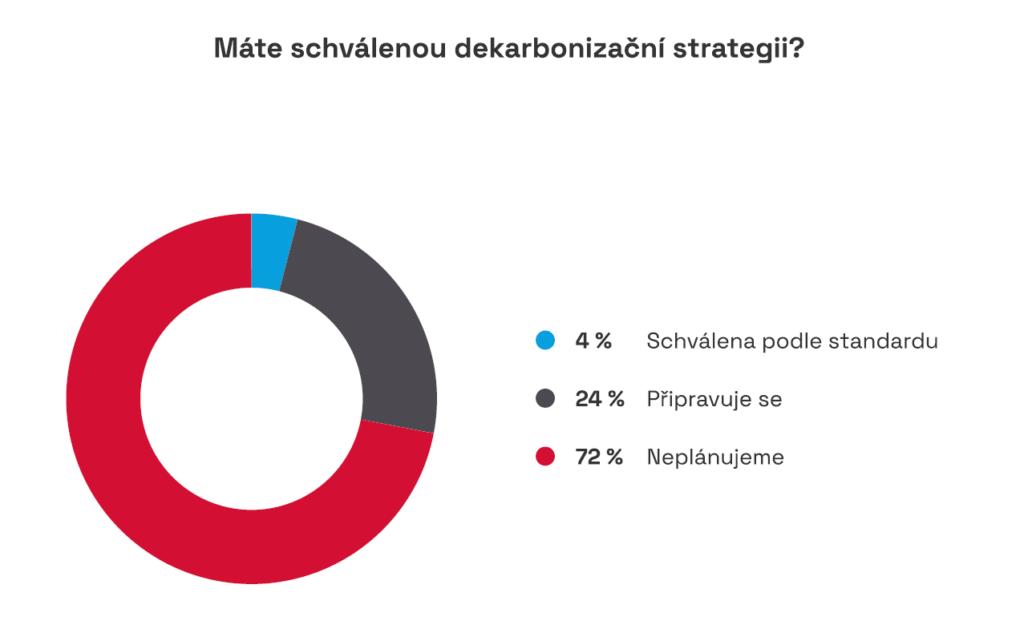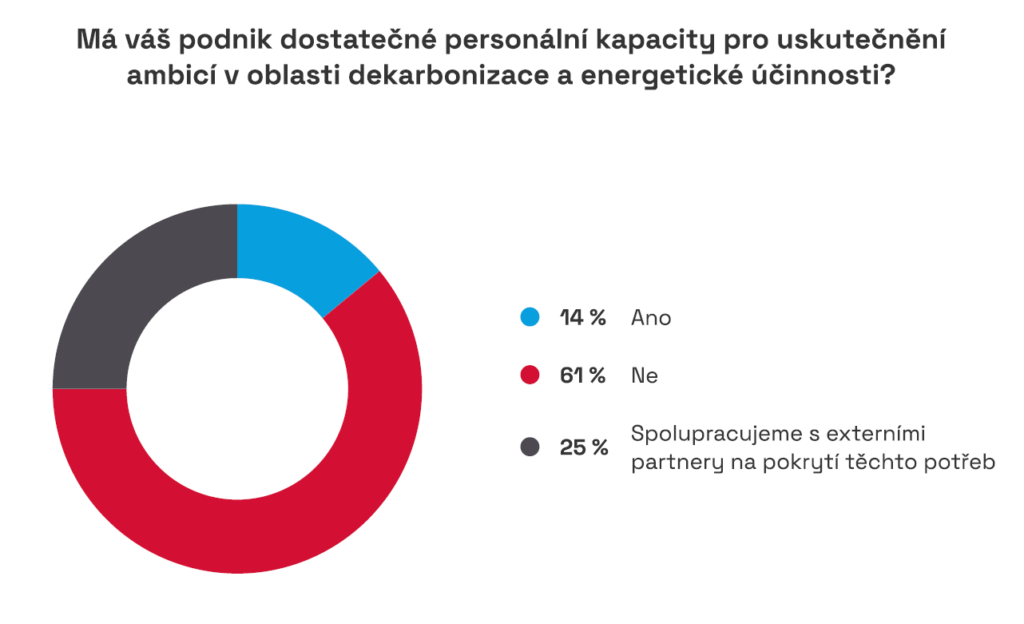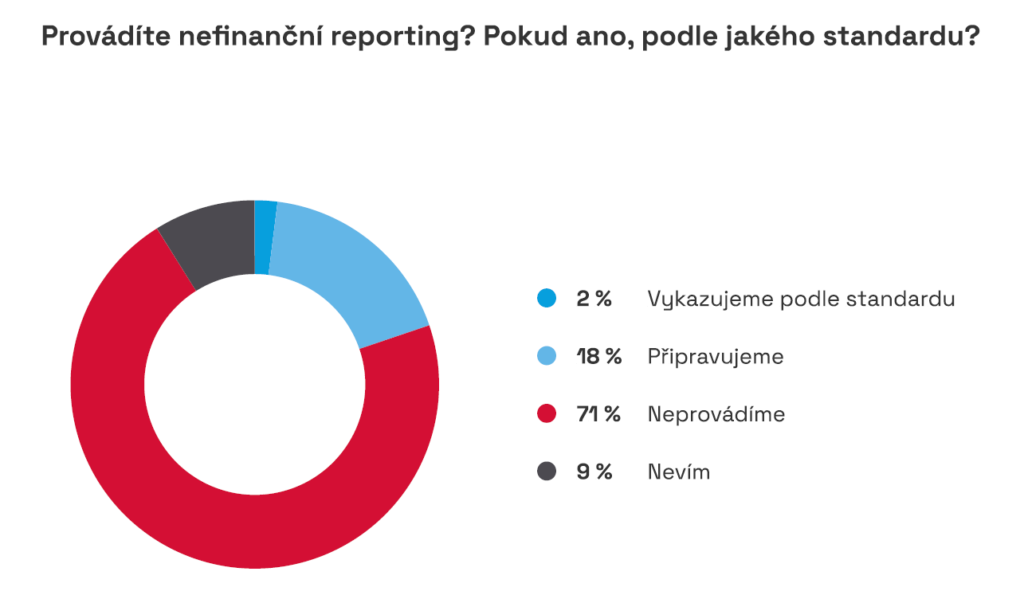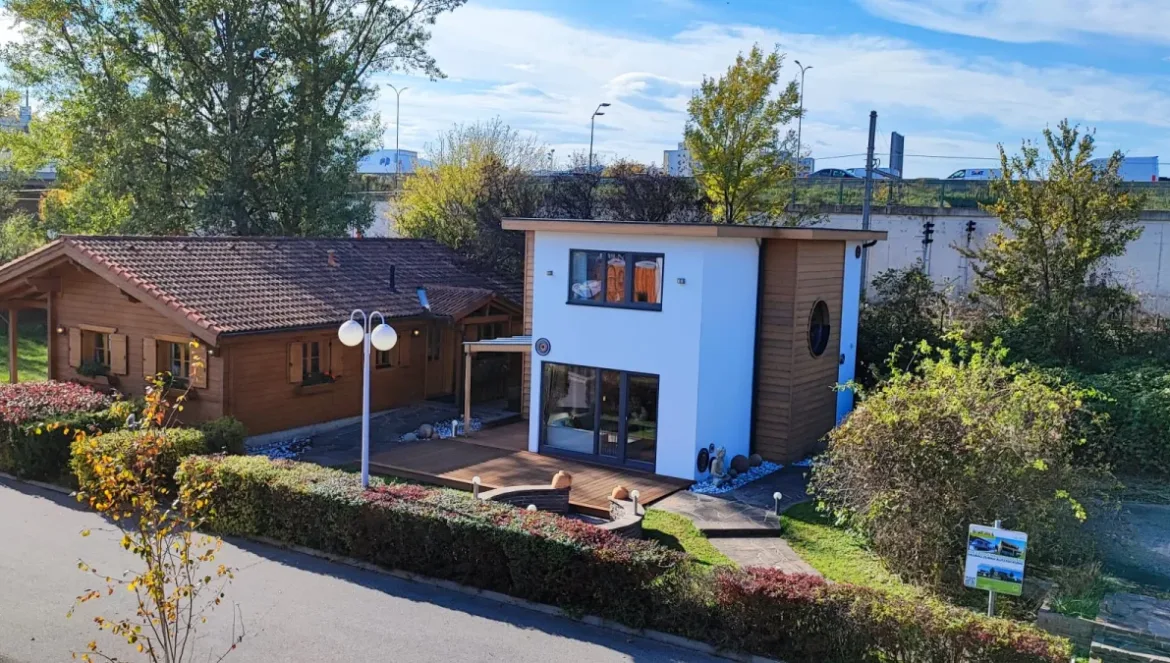Only a third of construction companies (38 %) are currently focusing on decarbonisation and improving energy efficiency in buildings. This relatively low share shows that despite the growing emphasis on sustainability and environmental standards, implementing these measures remains challenging for most companies. The main barriers include high upfront investments, the complexity of modern technologies or the lack of support from public institutions. The number of companies focusing on sustainable solutions is expected to increase as the pressure to reduce emissions and stricter requirements from clients and legislation grow. This is confirmed by the fact that 42 % companies plan to develop these activities over the next five years. This is according to a survey conducted by the analytical company CEEC Research in cooperation with the Czech BCSD (Czech Business Council for Sustainable Development).
A total of 72 % construction companies indicated that they do not have an approved decarbonisation strategy and do not plan to implement one in the coming years. This attitude can be a problem in meeting climate targets that are in line with national and European commitments to reduce emissions. Conversely, 24 % companies are preparing to implement a decarbonisation strategy because they see sustainable practices as a competitive advantage or a way to prepare for stricter regulations.
Abroad, the situation is different - in the UK, for example, 60 % construction companies have already implemented or are working on a decarbonisation strategy. This difference can be explained by greater legislative support and better financial incentives for sustainability. In some European countries, such as the Netherlands, there are even strict standards that require new buildings to meet high standards of energy efficiency and low emissions. This approach shows how regulation and financial support can accelerate the uptake of decarbonisation strategies across the sector.
"In terms of reducing the carbon footprint in buildings, operational emissions, such as lighting or heating, are still more important, accounting for 36 % of all emissions in the Czech Republic, while emissions embedded in the building account for 5-7 %. Therefore, it is now more important to insulate and renovate houses to reduce emissions, which the Ministry of the Environment significantly supports, for example, through the New Green Savings Programme or the successful Repair Grandma's House programme. As buildings become more operationally efficient, the need to reduce embodied emissions will also become more important. We already partially subsidise renovations, new builds or projects that also take into account the choice of environmentally friendly materials and the life cycle of the product," says Environment Minister on promoting sustainable construction Petr Hladik.
For sustainable construction, it is absolutely essential to design houses so that the supporting structure has the longest possible service life. More durable buildings do not require frequent structural interventions associated with the technical wear and tear of the structure. Fewer renovations, repairs and overall lower resource consumption over their lifetime reduces the overall environmental impact.
This is also the guiding principle of Wienerberger and its CEO and Managing Director, Kamil Jeřábek, He says: "Wienerberger delivers a comprehensive portfolio of innovative and sustainable solutions to the market. We strive to support the sustainability of our building materials with innovative projects in the circular economy. We are therefore committed to making newly developed products recyclable or reusable. In this way, we ensure the long-term availability of raw materials. This is our company's contribution to ensuring that raw materials are not consumed indefinitely, but that they are returned to nature."

A total of 72 % construction companies surveyed do not perform non-financial reporting. However, in Europe, especially within the EU, this practice is increasingly becoming mandatory. From 2025, large companies in the EU will have to comply with the Corporate Sustainability Reporting Directive (CSRD), which expands reporting requirements to include not only environmental, but also social and governance aspects. Companies will have to provide information on their environmental performance, energy consumption, emissions and other sustainability factors. For construction companies that choose to implement non-financial reporting, this can bring a number of benefits. Improved transparency on sustainability can improve their reputation and attract investors focused on ESG factors (environmental, social and governance).
The low number of companies with a decarbonisation strategy in place is related to the fact that only 14 % respondents have sufficient staff capacity to do so. A further 25 % firms work with external contractors who specialise in decarbonising buildings. This cooperation can give companies a competitive advantage as external experts have experience with the latest technologies. On the other hand, firms would benefit from a long-term strategy that includes training and development of internal capacities, which would reduce their dependence on external suppliers.

The CEEC Research survey shows that construction companies rank ownership of energy efficient buildings as one of the most significant benefits. Most companies (75 %) reported that they reduce operating costs in this way and 39 % of them appreciated the improvement of the company's image in terms of sustainability. Other benefits include increasing the value of the company's assets, i.e. buildings and machinery (31 %) and improving the working environment of employees (24 %). Only 12 % of the surveyed companies do not see any significant benefits in energy efficient buildings.
There are similar trends abroad - a study by the U.S. Green Building Council showed that companies with certified "green" buildings not only save up to 30 % in operating costs, but also have happier employees and lower turnover. In addition, these firms are more attractive to investors focused on ESG factors, which can lead to better financing terms.
Investing in energy-efficient buildings is thus proving to be a strategic move that not only improves the company's financial performance and image, but also increases its attractiveness to employees and investors.
Jiří Tesař, Sales Director of Subterra: "Our new buildings in all segments have significant environmental benefits. It is indisputable both in the case of transport projects, for example, and in the case of civil engineering, where investors today increasingly demand buildings with a high standard of sustainability according to BREEAM and LEED certification."
The Ministry of Industry and Trade also emphasises the efficiency of new technologies and provides advice on energy saving and innovation in the construction industry.
Lukáš Vlček, Minister of Industry and Trade, says: "MIT Actively support innovations aimed at energy efficiency and decarbonisation of the building sector in the form of energy saving measures and enabling greater use of renewable energy on-site or in the vicinity of buildings, which is key to the development of renewable energy. The Department offers financial incentives and subsidy programmes such as the Operational Programme on Technology and Applications for Competitiveness (OP TAK), the National Renewal Plan (NRP) and the Effect programme."

Tomas Koranda, Chairman of the Board of Hochtief CZ: "We refine information on the energy consumption and energy performance of our subcontractors' materials, products and supplies. At the same time, we identify appropriate solutions in the field of alternative materials, especially secondary raw materials, which have a significantly smaller carbon footprint than primary sources. We seek to apply local materials, particularly in transport infrastructure construction. This can reduce the carbon footprint associated with transport."
Secretary General of the Czech BCSD, Erika Duchanová, commented on the results of the analysis as follows: "We were very pleased to participate in the preparation of the survey on sustainability in the construction industry together with CEEC Research. The survey shows that many contractors are not yet aware of the importance of a decarbonisation strategy in the construction industry. However, this needs to change very quickly in light of SCOPE 3."
The data are based on Quarterly analysis of the Czech construction industry Q4/2024 prepared by the analytical company CEEC Research, which is published in full on www.ceec.eu.
CEEC Research Helena Grofová/ gnews - RoZ
ILLUSTRATION PHOTO - Facebook Green Buildings



